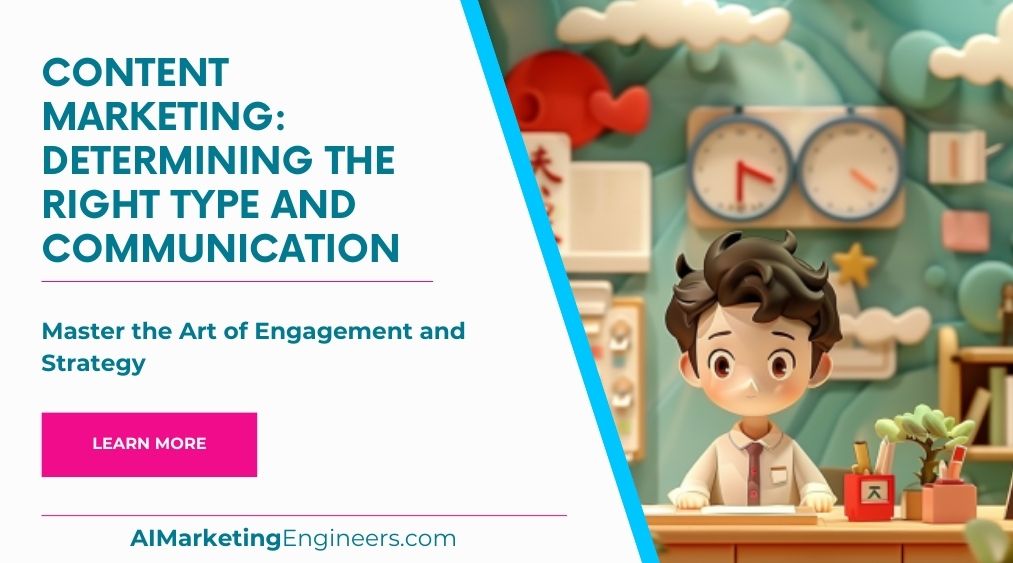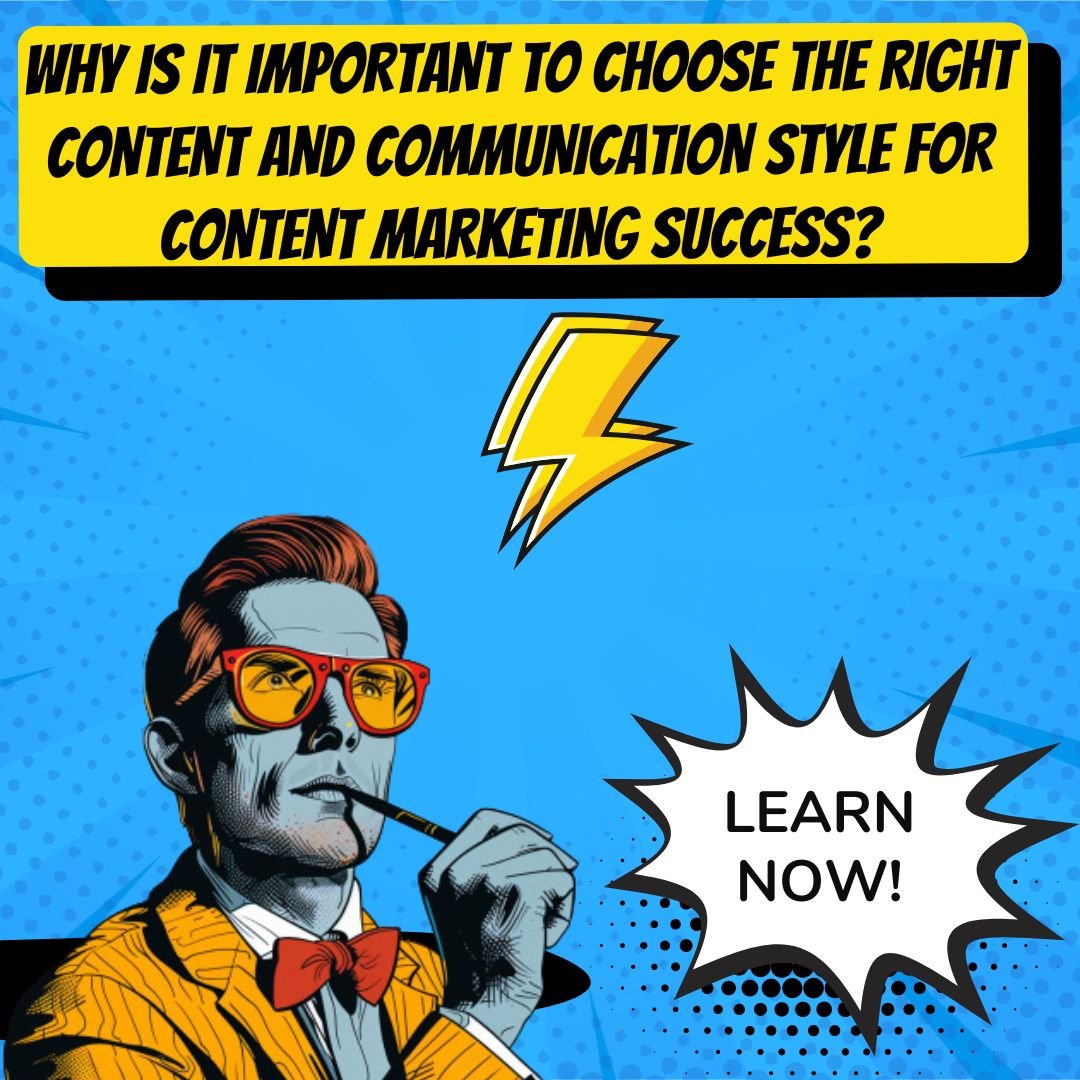Key Takeaways
✅ Understand Your Audience: Knowing your audience is not just about what you want them to learn about your product; it’s about understanding their needs, challenges, and what they are actively searching for online. Recent studies show that businesses that invest in audience research enjoy 73% higher engagement rates. Use tools like Google Trends and Buzzsumo to tap into these insights.
✅ Choose the Right Content Type: The digital landscape is cluttered with various forms of content. Whether it’s online content, social media posts, or podcasts, choosing the right platform can drastically improve your reach and resonance with your target market. With 80% of people remembering what they see, compared to what they read or hear, incorporating visual content like infographics could be a game-changer.
✅ Develop a Comprehensive Strategy: A piecemeal approach to content marketing is a common pitfall. A comprehensive strategy that encapsulates content creation, platform selection, and distribution can significantly enhance effectiveness. Organizations that have a documented content strategy report 62% higher success rates than those that don’t.
Introduction
Is your content marketing hitting the mark or missing it by miles? In today’s digital world, content marketing is not just an option; it’s a necessity. But, with the landscape constantly evolving, keeping up can feel like trying to build a boat in a storm. Determining the Right Type and Communication for content marketing can be the difference between your voice being heard or drowned out in the digital sea.
This article dives into the modern playbook of content marketing. From understanding your audience and selecting the ideal content formats to aligning your goals with your business objectives, we cover it all. With businesses generating an average of $2.78 in revenue for every dollar spent on content marketing, the stakes have never been higher.
Prepare to uncover actionable insights and cutting-edge strategies that will not only enhance your content’s performance but also maximize your return on investment. Let's unlock the secrets to creating content that not only resonates with your audience but also significantly boosts your bottom line.
Top Statistics
| Statistic | Insight |
|---|---|
| 54.5% of businesses plan to spend more on content marketing in 2024 than in 2023. | This shows a growing confidence in content marketing, highlighting its role as a central strategy for growth. |
| 83.2% of content marketers plan to use AI tools in 2024. | AI’s increasing role reveals the industry's direction towards more personalized and efficient content creation. |
| 89% of customers want to see more videos from brands in 2024. | Emphasizes the shift in consumer preference towards dynamic and engaging content formats. |
| 71% of content marketers reported using AI tools to help with content ideation. | Indicates that AI is not just a future anticipation but a present reality, becoming essential in creative brainstorming for effective content. |
| 73% of B2B marketers and 70% of B2C marketers use content marketing as part of their strategy. | This comparability suggests content marketing’s universal appeal and effectiveness across different business models. |
What is Content Marketing?
At its core, content marketing is about creating and sharing valuable free content to attract and convert prospects into customers, and customers into repeat buyers. It's an essential part of today's marketing strategies, especially in a world where consumers are bombarded with sales messages. Instead of pitching your products or services directly, it provides useful content to help your audience. Content marketing isn't new. Its roots can be traced back to the late 19th century with John Deere's launch of its customer magazine, The Furrow, offering farming tips and stories, a classic early example of content marketing.
Determining the Right Type of Content
Choosing the correct form of content starts with knowing who you’re talking to. Who is your target audience? What do they like, need, or want to learn about? Today’s content menu is more diverse than ever, ranging from blog posts and videos to podcasts and infographics. The key is matching your content type to what will best serve your audience’s preferences and your strategic goals. Is your goal to educate, entertain, inspire, or persuade? Let the answer steer your content format choice.
Understanding Content Goals and Objectives
Without clear goals, your content marketing efforts can easily drift off course. What are you aiming to achieve? Increased brand awareness, more website traffic, leads, or sales? Once goals are set, they should directly tie back to your broader business objectives. For instance, if increasing customer loyalty is a goal, crafting insightful, helpful content that adds value long after a purchase could be a successful strategy. Companies who get this right, such as HubSpot with its extensive library of marketing tutorials, set shining examples of goal-oriented content marketing success.

Effective Communication in Content Marketing
The power of content marketing lies in your ability to connect with your audience through your words and visuals. Crafting compelling headlines and engaging content isn’t just about getting attention; it’s about keeping it. Whether it's a 2000-word guide or a 30-second video, your content needs to inform, entertain, or solve a problem. Employing visuals, from photos to infographics, can dramatically boost the attractiveness and understandability of your message.
Measuring Success in Content Marketing
How do you know if your content marketing is working? Key performance indicators (KPIs) like website traffic, engagement rates, and conversion rates offer valuable insights. Various tools can track these metrics, helping marketers adjust their strategies for better results. For instance, seeing a campaign that consistently meets or exceeds goals in terms of engagement and conversions can serve as a model for future efforts, demonstrating the tangible impact of well-executed content marketing.
Best Practices and Future Trends in Content Marketing
To stay ahead in the fast-evolving landscape of content marketing, marketers must keep a pulse on latest trends and consumer behaviors. Technological advancements, like artificial intelligence and virtual reality, are set to redefine how content is created and consumed. Adapting to these changes while maintaining authentic, value-driven communication with your audience will be key. Innovative strategies, such as personalization and interactive content, are not just future possibilities—they're here, reshaping how we engage with our audiences today.
AI Marketing Engineers Recommendation
Recommendation 1: Embrace the Power of Video Content: Recent studies show that video content isn't just popular among consumers; it's effective. For instance, incorporating videos on landing pages can increase conversion rates by over 80%. Consumers are also said to retain 95% of a message when they watch it in a video compared to 10% when reading it in text. The takeaway? Start creating engaging, informative videos that tell your brand's story or demonstrate your product.
Recommendation 2: Leverage Data Analytics for Personalized Content Creation: One size does not fit all when it comes to content marketing. The digital era demands personalization. Thanks to advanced analytics and AI, marketers now have the tools to understand their audience's preferences, behaviors, and needs in real-time. Use this data to tailor your content, making it resonate with your audience. Personalized email campaigns, for instance, have been shown to deliver six times higher transaction rates.
Recommendation 3: Utilize SEO Tools to Optimize Your Content. Knowing what your target audience is searching for online can significantly influence your content strategy. Tools like Google Analytics, Ahrefs, or SEMrush can provide insights into the keywords and topics your audience cares about. Use this information to optimize your content for search engines, making it more likely that your target audience will find it. SEO is not just about keywords; it's about creating quality, relevant content that answers your audience's questions and solves their problems.
Conclusion
In wrapping up our dive into the world of Content Marketing: Determining the Right Type and Communication, it's evident that mastering content marketing is not just about producing material—it's about crafting the right message for the right audience at the right time. We've uncovered that at the heart of successful content marketing lies a deep understanding of your audience and a strategic alignment of your content goals with your overall business objectives. This strategy ensures that every blog post, video, or tweet serves a purpose larger than the sum of its likes and shares.
Determining the right type of content involves a balancing act between innovative formats and the timeless need for engaging, informative content. It's about choosing the vehicle that best carries your message into the daily lives of your audience. We've also seen how effective communication through compelling headlines and visually appealing content can significantly boost engagement and, ultimately, conversion rates.
With technology and consumer behavior continuously evolving, staying ahead in the content marketing game requires not just creativity and adaptability but also a keen eye on measuring success through relevant KPIs. This approach not only proves the value of your content strategy but also provides insights into how it can be refined and improved over time.
As we look to the future, remember: content marketing is a dynamic field ripe with opportunities for those willing to listen to their audience and innovate accordingly. Whether you're a seasoned marketer or a newcomer to the scene, the key takeaway is clear: invest in understanding your audience and crafting a tailored content strategy that speaks directly to their needs and desires. Your brand's story is worth telling, so why not tell it in a way that resonates? Let's not just chase trends but set them, creating content that cuts through the noise and leaves a lasting impression.
FAQs
Question 1: What is content marketing?
Answer: Content marketing is a strategic marketing approach focused on creating and distributing valuable, relevant, and consistent content to attract and retain a clearly defined audience, ultimately driving profitable customer action.
Question 2: Why is content marketing important?
Answer: It drives awareness, develops trust, and results in the acquisition of new paying customers by providing valuable information that meets the needs of potential leads or answers their questions.
Question 3: What qualifies as content?
Answer: Any valuable information, conveyed via any medium, can be considered content, including videos, infographics, slideshares, PDFs, blogs, articles, podcasts, whitepapers, ebooks, and webinars.
Question 4: How should I get started with content marketing?
Answer: Develop a strategy first, determining your target audience and creating a customer persona. Then, decide on your company’s voice and the type of content you will create.
Question 5: What are the steps to developing a content marketing strategy?
Answer: Determine your target audience, develop a customer persona, decide on your company’s voice, and plan the type of content you will create. Ensure your content is informative, valuable, and engaging to your target demographic.
Question 6: Does content marketing work?
Answer: Yes, it supports marketing and business goals. Track your content marketing program and communicate its success to your team and management.
Question 7: How does content marketing drive revenue?
Answer: It starts by building a strong business case that doesn’t directly attack people, their teams, or their budgets. Content marketing ROI is higher than the average marketing ROI.
Question 8: Is there a difference between B2C and B2B content marketing?
Answer: Yes and no. While the principles of content marketing apply to both, the approach and content types may differ depending on the target audience.
Question 9: How can content marketing make me into an industry thought leader?
Answer: By creating unique, original content that demonstrates your expertise and answers questions consumers might have, you can establish trust and become recognized as an expert in your field.
Question 10: What is the role of keywords in content marketing?
Answer: Keywords are still important, but the priority is to write for humans, not search engines. Include a few mentions of the exact words and phrases you want to be found for.
Question 11: Do I need an editorial calendar?
Answer: While not always necessary, planning your content a month in advance can help ensure consistency and organization.
Question 12: How do I make my content engaging?
Answer: Speak to your target audience’s pain points or interests, and invite them to respond. The beauty of content marketing is that communication is not one-way anymore.
Question 13: How do I measure the performance of my content marketing?
Answer: Track social media shares and use Google Analytics to assess the effectiveness of each piece of content. Define "success" using metrics like traffic, repeat visits, retweeting, liking, and SEO.
Question 14: How do I stay abreast of the latest developments in the content marketing world?
Answer: Stay up to date through marketing blogs, social media algorithm adjustments, and reading widely on marketing.
Question 15: When analyzing the success or failure of a content marketing campaign, what metrics do I consider?
Answer: Focus on metrics closely linked to business strategy, such as KPIs, page views, visits, lead creation, and brand awareness.
Question 16: How do I market my content after its publication?
Answer: Develop a strategy to promote your work, including posting across social media platforms, repurposing in outbound newsletters and emails, and enlisting the help of industry influencers.
Academic References
- Vinerean, S. (2017). Importance of strategic social media marketing in digital environments. Economic Computation & Economic Cybernetics Studies & Research, 51(1), 5-22. This study defines content marketing and outlines its objectives and tactics, highlighting the importance of content marketing in digital marketing and its potential to create long-lasting relationships with consumers.
- Koob, C. (2021). A contingency approach to content marketing. Journal of Marketing Management, 37(3-4), 276-295. This study conceptualizes content marketing as a set of activities embedded in and contingent on the specific organizational context, and empirically investigates the context features determining content marketing effectiveness from a managerial perspective.
- Scoping Review. (2022). The effect of content marketing on online consumer behavior in the luxury market. Journal of Brand Management, 29, 43-58. This review examines the effect of content marketing on online consumer behavior, highlighting the mechanisms of luxury content a marketing and the role of digital content marketing in enhancing consumer engagement and purchase decisions.
- Geng, R., Bose, I., Chen, X., & Wei, J. (2020). The impact of internet content marketing on consumer behavior among students: An empirical study from China. Information Processing & Management, 57(6), 102349. This study captures both first-order and second-order effects of internet content marketing on consumer behavior, providing insights into the impact of content marketing on consumer decision-making processes.
- Lou, C., & Yuan, S. (2019). Influencer marketing: How message value and credibility affect consumer trust of branded content on social media. Journal of Interactive Advertising, 19(1), 58-73. This study tests the role of branded content marketing on YouTube in brand building and examines the relationship between social media content marketing and consumer purchase decisions.






